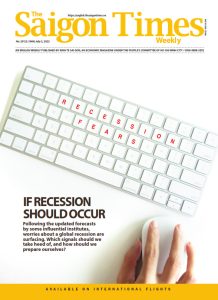High inflation caused by rising costs and a shortage of input materials cannot be resolved by increasing interest rates. Moreover, getting inflation under control in many economies, such as the United States, would lead to recession.
Causes of stock market’s decline
After the U.S. Federal Reserve raised the federal funds rate by three-quarters of a percentage point on June 16, the Vietnamese stock market followed the U.S. market to go upward, with the VN-Index adding 22 points. It seemed that forecasts about the Fed’s interest rate hike had been reflected through previous plunging sessions, and when the official news was announced, its impact was not too big.
However, on June 17 and 20, the market saw a sharp fall, proving that the impact of bad news was not reflected adequately in the market. In these two sessions, the VN-Index lost 56 points, or over 3%, while the HNX-Index posted a steeper fall, at 4.33%.
The Hochiminh and Hanoi Stock Exchanges reported a sharp fall with a high volume of stocks being sold at their floor prices at the end of sessions, especially speculative stocks in the real estate sector and those with a small market capitalization (penny stocks). This signals the possibility of force selling after the plunging sessions. Among the 407 stocks closing down on June 20, 145 hit their daily floor prices, making up over 35%.
According to a recent report of the chief economist of VinaCapital Fund Management JSC, the total value of margin loans in the market has fallen by VND60.6 trillion, or 30% from the VND202 trillion at the end of the first quarter of the year. The reduction helped ease the sell-off pressure in May and pave the way for the strong recovery of the market in the second half of May. However, some investors, who have enhanced the use of margins to bottom fish stocks, are now faced with the requirement of increasing deposits or forced selling.
Many stocks, which have continuously fallen to their floor prices, are those of enterprises owned by the same persons and with the same shareholders. Stocks in the FLC and Louis families have plummeted since their leaders were arrested for allegedly manipulating stock prices. Investors are still concerned over similar cases, so such stocks have been hit heavily.
Has all the bad news come out?
Meanwhile, the risk of bad news remains, and not just from tight monetary policies by the Fed and central banks of countries worldwide. Speaking after a meeting in mid-June, Fed Chairman Jerome Powell said there would be more 0.75-percentage-point interest rate hikes in the next meetings until inflation was brought under control. Meanwhile, following the Fed, the Bank of England decided to raise the interest rates to the highest levels since early 2009, and the European Central Bank will increase the interest rates from July.
Nevertheless, Vietnam bucked the trend. At a press briefing to announce the results of the implementation of monetary policy and the performance of the banking sector in the first half of the year and plans for the rest of the year on June 18, Deputy Governor of the State Bank of Vietnam (SBV) Dao Minh Tu said the bank would keep the operating interest rate unchanged despite the pressure from the global trend of monetary tightening to facilitate credit institutions to access capital resources with low costs, thus reducing their lending rates to support customers in recovering production and business.
Contrary to the recent forecasts of many organizations about the possibility of SBV’s increase of the operating interest rate in the second half of this year, SBV’s information has denied the forecasts, which was expected to help put the minds of investors in the domestic market at ease. In addition, SBV Deputy Governor Tu added the credit growth target for this year was 14%, but the target might be adjusted, depending on the economy’s actual demands. This proves that Vietnam has yet to tighten monetary policy like many other economies.
Nevertheless, current concerns do not come only from the interest rate volatility. In the international market, central banks’ interest rate hikes are no longer the biggest concern as in previous months, but the risk of recession in major economies, such as the United States. According to analysts, the inflation pressure has resulted from the scarcity and shortage of many basic goods given supply chain disruptions. Therefore, the interest rate hike will not help solve the problem. It may even reduce the consumer demand which is currently low, thereby impeding economic growth.

In reality, analysts on Wall Street said the possibility of the U.S. economy’s recession had been greater after the Fed announced the largest-ever interest rate increase since 1994, while statistics showed that consumer demand has been lower. Wells Fargo & Co. has forecast a mild recession of the U.S. economy from mid-2023, while Bloomberg Economics predicted the possibility of a recession of the U.S. economy has reached 75% although the possibility was first seen several months ago.
In addition, recent statistics indicated a sharp slowdown in important sectors in the U.S. economy, increasing the risk of economic sluggishness and even a crisis. In May, housing project supplies in the United States plunged, while the spending of U.S. residents fell for the first time since early 2022.
High inflation caused by rising costs and a shortage of input materials cannot be solved by increasing interest rates; the recession risk has been greater, forcing many economies, such as the United States, to face a high risk of inflation.
As an open economy with foreign trade contributing significantly to the country’s economic growth, Vietnam is affected when its large trade partners, which are also leading economies worldwide, are facing a slowdown.
Such a negative outlook will obviously hit investment channels, such as securities.









